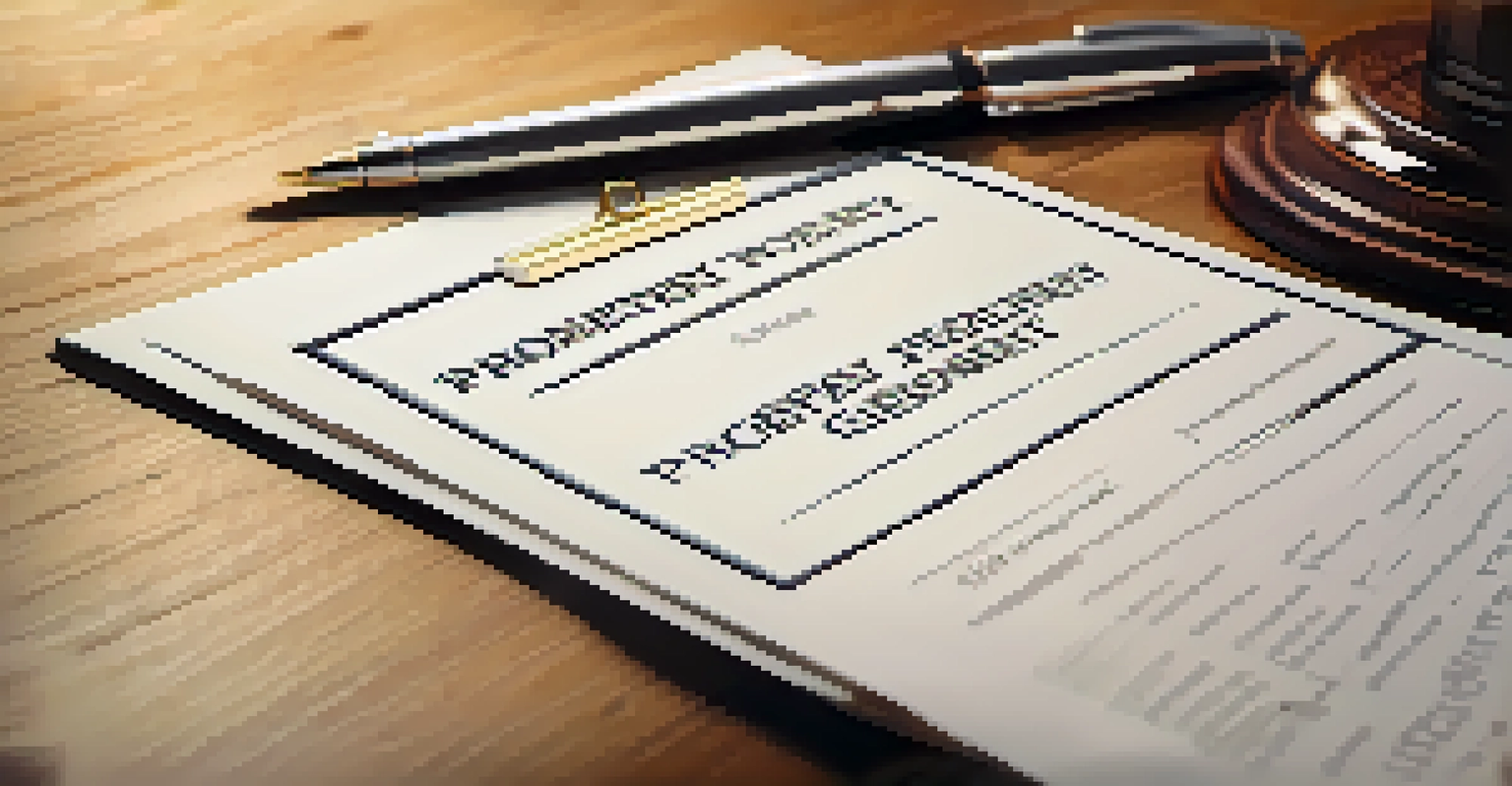How to Protect Yourself from Real Estate Fraud and Scams

Understanding Real Estate Fraud and Its Types
Real estate fraud can take many forms, from identity theft to property scams. Understanding these types can help you recognize red flags. Common fraud types include mortgage fraud, rental scams, and title fraud.
An ounce of prevention is worth a pound of cure.
For instance, in a rental scam, a fraudster may pose as a landlord and ask for deposits on non-existent properties. In mortgage fraud, someone might use false information to secure loans. Knowing these scenarios can empower you to stay vigilant.
By familiarizing yourself with these types of fraud, you are more likely to spot suspicious activity early. This knowledge forms the first line of defense in protecting your investments and personal information.
Researching the Property and Seller Thoroughly
Before making any real estate decision, it's crucial to research both the property and the seller. Start by checking property records, which are usually available through your local government. This will help verify ownership and ensure the seller has the right to sell the property.

Additionally, look up online reviews and testimonials about the seller or real estate agent. A trustworthy seller will have a solid reputation and positive feedback from past clients. If the seller's history seems sketchy, consider it a warning sign.
Know Types of Real Estate Fraud
Understanding different types of real estate fraud, such as rental scams and mortgage fraud, empowers you to recognize red flags and protect your investments.
Don't hesitate to contact previous buyers or renters to gather insights. This thorough research not only helps you avoid scams but also builds confidence in your purchasing decision.
Utilizing Trusted Real Estate Professionals
Working with reputable real estate professionals can significantly reduce your risk of encountering fraud. Look for licensed agents who have solid experience and good reviews. These professionals are knowledgeable about the local market and can guide you through the process safely.
The best way to predict the future is to create it.
It's also wise to consult a real estate attorney, especially for complex transactions. They can provide legal insights and ensure all paperwork is in order. This extra layer of protection can be invaluable.
By leveraging the expertise of trusted professionals, you create a safety net that makes it harder for fraudsters to succeed. Their guidance can help you make informed decisions and navigate potential pitfalls.
Recognizing Red Flags in Listings
When browsing property listings, be on the lookout for red flags that may indicate a scam. Listings that seem too good to be true often are, such as properties priced significantly lower than market value. This could be a tactic to lure in unsuspecting buyers.
Another red flag is vague or missing details in the listing. If the description lacks specifics about the property or the seller, proceed with caution. Legitimate listings typically provide comprehensive information, including high-quality images.
Research Property and Seller
Thoroughly researching the property and seller, including checking records and reviews, helps build confidence and avoid potential scams.
Always trust your instincts; if something feels off, investigate further. By being vigilant and discerning, you can avoid falling victim to fraudulent schemes.
Secure Financial Transactions and Payments
When it comes to real estate transactions, secure your financial dealings to prevent scams. Always use established payment methods and avoid wiring money directly to unknown parties. Scammers often request wire transfers due to their irreversible nature.
Instead, consider using escrow services, which hold funds until all conditions are met. This adds an extra layer of protection to your transaction, ensuring you don't lose your money without receiving the property.
Keeping your financial information private is also crucial. Be cautious about sharing sensitive data and only do so with trusted parties. Safeguarding your finances is a key step in protecting yourself from fraud.
Verifying Property Titles and Ownership
Before finalizing any purchase, verify the property title and ownership to avoid title fraud. A title search can reveal whether the seller has the legal right to sell the property. This process typically involves checking public records.
You may also want to invest in title insurance, which protects you against potential claims to the property after purchase. This insurance can cover legal fees if disputes arise, providing peace of mind.
Trust Your Instincts
Listening to your intuition and seeking advice from trusted sources can prevent you from making hasty decisions that may lead to real estate fraud.
By ensuring clear ownership and securing title insurance, you significantly reduce the risk of encountering issues later on. Being proactive in these areas protects your investment.
Educating Yourself on Local Real Estate Laws
Understanding local real estate laws can help you navigate the market more safely. Laws vary by state and locality, impacting everything from property disclosures to tenant rights. Familiarizing yourself with these regulations can prevent misunderstandings.
Consider joining local real estate associations or attending workshops to stay informed. These resources provide valuable insights into current laws and best practices, equipping you with knowledge to protect yourself.

The more you know about your rights and obligations, the better equipped you'll be to spot potential scams. This education serves as a powerful tool in safeguarding your real estate endeavors.
Trusting Your Intuition and Seeking Help
Finally, trust your intuition when it comes to real estate transactions. If something feels off or makes you uncomfortable, don't hesitate to step back and reevaluate. Scammers often rely on high-pressure tactics to rush you into decisions.
If you're unsure about a situation, don't hesitate to consult with trusted friends, family, or professionals. They can provide fresh perspectives and help you assess any potential risks.
Remember, it's always better to be cautious than to rush into a deal you might regret. By trusting your gut and seeking guidance, you significantly enhance your protection against real estate fraud.